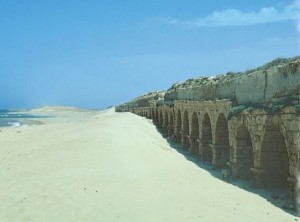On our last tour in 2011, in route to our hotel in Caesarea we had a brief stop at the aqueduct that Herod built where we waded in the Mediterranean Sea. How Refreshing. I’m hoping we get to do the same thing this year. This  Caesarea needs to be distinguished from several others so it’s also been known as Caesarea-on-the-Sea (Maritima), Caesarea Sebaste, Caesarea of Palestine, and Caesarea of Judea. There is a well preserved amphitheater here that could very well have been the place where Paul presented a defense of himself and his preaching to Felix, Festus and even Herod himself.
Caesarea needs to be distinguished from several others so it’s also been known as Caesarea-on-the-Sea (Maritima), Caesarea Sebaste, Caesarea of Palestine, and Caesarea of Judea. There is a well preserved amphitheater here that could very well have been the place where Paul presented a defense of himself and his preaching to Felix, Festus and even Herod himself.
Herod’s kingdom lacked a deep water port that could accommodate the larger Roman cargo vessels so he had engineers expand an ancient Phoenician port into a large harbor facility. This was an unprecedented effort. As a modern trading port it turned Caesarea into a major commerce center, but also a center for a plethora of vile religious expressions. In one of the warehouses, excavators discovered a Mithraeum—a place imitating a cave where the god Mithras was worshiped in secret ceremonies—complete with an altar and a medallion depicting Mithras slaying a bull. A temple to Roma and Augustus stood high on a raised platform east of the harbor. Although there was a Jewish community here, it was thoroughly a Hellenistic- Roman city with a large garrison of Roman soldiers.
One of the more interesting biblical accounts related to this site is found in Acts 10:1-15. It begins, “At Caesarea there was a man named Cornelius, a centurion of what was known as the Italian Cohort.” The story proceeds to tell us that God sent an Angel to him to send for a man staying with Simon the Tanner in Joppa. Cornelius sends two soldiers to get Peter. In the meantime, God is preparing Peter for the arrival of these filthy pagans. On a rooftop in Joppa, Peter became hungry and in a dream, a sheet descends filled with vile, disgusting creatures forbidden by the law to consume. Only the vile, disgusting pagans would eat such things. God tells Peter to eat! But, no, Peter won’t defile himself. But after three times, God commands Peter not to call “unclean” that which He has declared “clean” (Acts 10:15). Peter realizes that the dream is not referring to the vile creatures forbidden as food by the law, but is referring to those who eat them, i.e., the pagans. Peter goes to Cornelius’ house and preaches the gospel. Peter may have planted a Church here. I’m guessing, but the early Church Fathers, Origen and Eusebius, were profoundly influenced by Peter’s teachings. They taught and wrote from their residence in Caesarea. No pagan, not even those soaked in Mithraism or any other vile practice is beyond the reach of Jesus. That’s the good news for you and me!